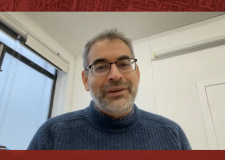Coronavirus Latest: COVID-19 Questions, questions!
As of today, the US have placed restrictions on travel from the UK and the UK could ban mass gatherings from next week. Each day brings new information and restrictions, whilst the novel virus travels freely around the globe.
At this point in time, the questions people have about the coronavirus increase in number, as fast as the number of confirmed cases worldwide.

People looking for reassurance may feel confused about the UK government’s response compared with other countries. Everyone understands that it is a new virus so more needs to be known about its behaviour but what’s hard to understand is how can the world best work together to outwit this virus as quickly as possible. There is the scientific knowledge about the virus which is unfolding all the time; there are the different government decisions to combat or manage the spread of the disease; there are the health service workers on the frontline, working as if in a war zone; and there is the virus itself which seems to be unhealthily replicating across populations, holidaying within the gaps in our knowledge.
There has been a lot of media discussion about whether encouraging herd immunity is the right response. There are related questions around whether people can be re-infected or whether immunity is largely maintained after infection; whether the summer months may help to kill it off, or whether it will remain with us for many months to come; whether it is already becoming an endemic disease and will reappear year after year.
It can be overwhelming to distil all the information and make the right personal choices. To go out or stay in! To visit elderly relatives or to skype! To panic a bit about business and work, or to panic a lot. To cancel events and journeys or to wait and see. To be stoic or to be scared.
What is helpful is to look for the consensus decisions in this country and across the world and to focus on the facts (ie, be stoic!)
There seems to be a lot of agreement that countries want to “flatten the curve” of the virus – meaning that they want to delay and pace out the spread of the disease, so that health systems can cope with the number of cases.
In this country, even though there is talk of herd immunity (effectively letting people become infected to build up immunity), there are also strict instructions that people should isolate themselves at the first signs of illness, namely fever and a new cough, to halt or delay the spread of disease.
Countries have a spectrum of restrictions from self-isolation at the sign of symptoms to total lockdown of entire populations, and there are disagreements around the social distancing measures that each country should take. The UK Government has been criticised by some scientists for its particular, quite stoic policy, so the government is hopefully going to be more explicit about the mathematical modelling behind its approach. People want to know how risky is this strategy for themselves and their families.
Against the scientific and political background, many commentators are talking about the psychological impact this virus has on people. Uncertainty is creating more worry. For example, the whole issue of testing is a grey area. How can people tell whether they have the virus if the test criteria is so stringent, and they have possible symptoms but are told to self-isolate with no testing offered. How can we be sure the numbers are relevant if every country tests so differently?
When the UK has 16.8 cases per million population and Italy has 349.9 cases per million, it would be useful to know the percentage tested per population. Worldometers.info have collated this testing information https://www.worldometers.info/coronavirus/covid-19-testing/
The UK has reported more tests (over 37,000 as of 14 March). The criteria for UK testing is given here: https://www.gov.uk/government/news/coronavirus-testing/
When China has several thousands in a severe or critical condition, but daily report a small number of deaths, what therapy are they giving to keep people alive for longer.
The number of cases, the number of deaths, the numbers of those recovered, the numbers of those in a severe or critical state raise so many other questions. Should we be comparing the numbers with seasonal flu – have the flu figures gone up or down. If there is not comprehensive testing, how do we know what is flu and what is coronavirus? Are all deaths monitored in the same way globally. Or are some diagnoses of pneumonia actually coronavirus related. Getting a handle on the measurement of this wily virus is important.
In the meantime, why are Italians so extrovert and banging tambourines on balconies? Is it because they know it’s a nightmare, and don’t have expectations that their government will save them! And that in the main, they will survive.
Angi Mariani
Originator of Immunos versus Pathos





















